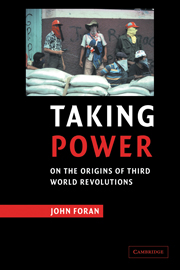Introduction
Published online by Cambridge University Press: 22 September 2009
Summary
The twentieth century, as much as any before it, must be judged an age of revolutions. The locus of these revolutions, with the important exceptions of Russia in 1917 and the startling events in Eastern Europe in 1989, has been firmly rooted in the Third World, on the continents of Latin America, Asia, and Africa. The record of these revolutions is highly mixed: almost all have started as popular movements which generated wide hope and optimism both internally and internationally, yet have ended at some later point in time, in economic crisis, political repression, or social failure.
The present study is one not of tragic ends, however, but of hopeful origins. It seeks to extend previous work by myself and others on the causes of successful social revolutions to a consideration of why so few revolutions have earned the label “social” revolutions, while so many have fallen short of the sorts of deep economic, political, and social change that could justify this claim.
This book will survey the causes of a wide variety of Third World revolutions, from cases of successful outcomes (measured in terms of taking and holding state power long enough to engage in a project of social transformation) to their close relations among the anti-colonial social revolutions, comparing and contrasting these with cases that have resulted in short-lived success followed by abrupt reversal, attempted revolutions, political revolutions, and the absence of revolutionary attempts where we might otherwise have expected them to occur.
- Type
- Chapter
- Information
- Taking PowerOn the Origins of Third World Revolutions, pp. 1 - 2Publisher: Cambridge University PressPrint publication year: 2005

